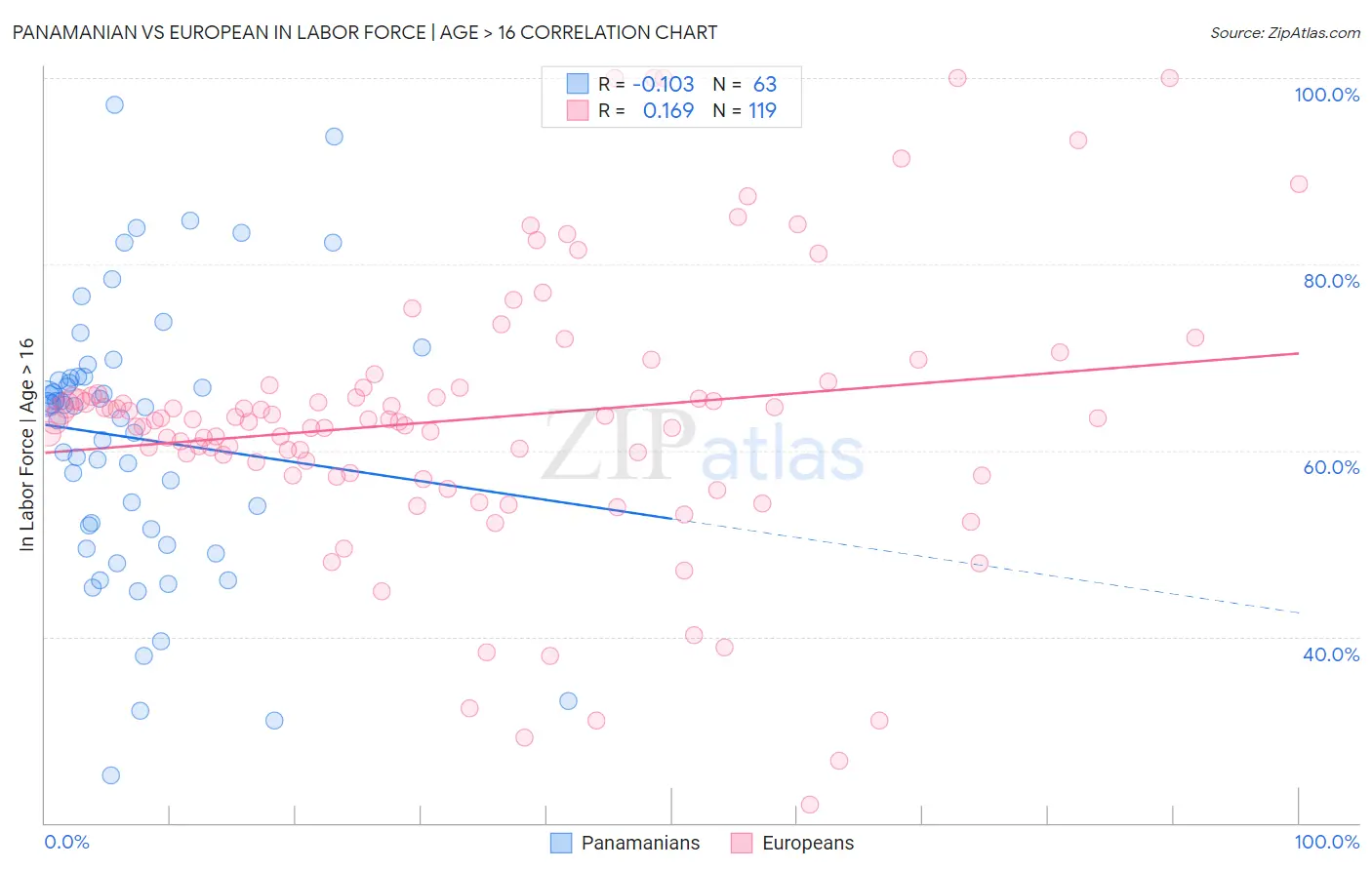Panamanian vs European In Labor Force | Age > 16
COMPARE
Panamanian
European
In Labor Force | Age > 16
In Labor Force | Age > 16 Comparison
Panamanians
Europeans
65.3%
IN LABOR FORCE | AGE > 16
75.2/ 100
METRIC RATING
158th/ 347
METRIC RANK
64.7%
IN LABOR FORCE | AGE > 16
8.3/ 100
METRIC RATING
226th/ 347
METRIC RANK
Panamanian vs European In Labor Force | Age > 16 Correlation Chart
The statistical analysis conducted on geographies consisting of 281,243,472 people shows a poor negative correlation between the proportion of Panamanians and labor force participation rate among population ages 16 and over in the United States with a correlation coefficient (R) of -0.103 and weighted average of 65.3%. Similarly, the statistical analysis conducted on geographies consisting of 561,841,605 people shows a poor positive correlation between the proportion of Europeans and labor force participation rate among population ages 16 and over in the United States with a correlation coefficient (R) of 0.169 and weighted average of 64.7%, a difference of 0.99%.

In Labor Force | Age > 16 Correlation Summary
| Measurement | Panamanian | European |
| Minimum | 25.1% | 22.0% |
| Maximum | 97.1% | 100.0% |
| Range | 72.0% | 78.0% |
| Mean | 61.3% | 63.4% |
| Median | 64.8% | 63.3% |
| Interquartile 25% (IQ1) | 51.5% | 57.6% |
| Interquartile 75% (IQ3) | 67.9% | 66.7% |
| Interquartile Range (IQR) | 16.4% | 9.1% |
| Standard Deviation (Sample) | 14.7% | 14.7% |
| Standard Deviation (Population) | 14.6% | 14.7% |
Similar Demographics by In Labor Force | Age > 16
Demographics Similar to Panamanians by In Labor Force | Age > 16
In terms of in labor force | age > 16, the demographic groups most similar to Panamanians are Immigrants from Ireland (65.3%, a difference of 0.010%), Immigrants from Russia (65.3%, a difference of 0.010%), Immigrants from Syria (65.3%, a difference of 0.010%), Immigrants from Armenia (65.3%, a difference of 0.020%), and Immigrants from South Africa (65.3%, a difference of 0.030%).
| Demographics | Rating | Rank | In Labor Force | Age > 16 |
| Czechs | 81.5 /100 | #151 | Excellent 65.4% |
| Yugoslavians | 81.3 /100 | #152 | Excellent 65.4% |
| Immigrants | China | 80.5 /100 | #153 | Excellent 65.4% |
| Immigrants | Eastern Europe | 78.3 /100 | #154 | Good 65.4% |
| Immigrants | Armenia | 76.6 /100 | #155 | Good 65.3% |
| Immigrants | Ireland | 75.9 /100 | #156 | Good 65.3% |
| Immigrants | Russia | 75.7 /100 | #157 | Good 65.3% |
| Panamanians | 75.2 /100 | #158 | Good 65.3% |
| Immigrants | Syria | 74.6 /100 | #159 | Good 65.3% |
| Immigrants | South Africa | 73.5 /100 | #160 | Good 65.3% |
| Australians | 71.3 /100 | #161 | Good 65.3% |
| Albanians | 70.8 /100 | #162 | Good 65.3% |
| South Africans | 69.8 /100 | #163 | Good 65.3% |
| Danes | 68.8 /100 | #164 | Good 65.3% |
| Immigrants | Kazakhstan | 68.1 /100 | #165 | Good 65.3% |
Demographics Similar to Europeans by In Labor Force | Age > 16
In terms of in labor force | age > 16, the demographic groups most similar to Europeans are Polish (64.7%, a difference of 0.0%), Northern European (64.7%, a difference of 0.0%), Immigrants from Jamaica (64.7%, a difference of 0.020%), Croatian (64.7%, a difference of 0.020%), and Immigrants from Belize (64.7%, a difference of 0.030%).
| Demographics | Rating | Rank | In Labor Force | Age > 16 |
| Immigrants | Central America | 10.5 /100 | #219 | Poor 64.7% |
| Alaska Natives | 9.9 /100 | #220 | Tragic 64.7% |
| Immigrants | Micronesia | 9.6 /100 | #221 | Tragic 64.7% |
| Hawaiians | 9.3 /100 | #222 | Tragic 64.7% |
| Immigrants | Belize | 9.2 /100 | #223 | Tragic 64.7% |
| Immigrants | Jamaica | 8.8 /100 | #224 | Tragic 64.7% |
| Croatians | 8.8 /100 | #225 | Tragic 64.7% |
| Europeans | 8.3 /100 | #226 | Tragic 64.7% |
| Poles | 8.3 /100 | #227 | Tragic 64.7% |
| Northern Europeans | 8.2 /100 | #228 | Tragic 64.7% |
| British | 7.3 /100 | #229 | Tragic 64.7% |
| Chinese | 7.3 /100 | #230 | Tragic 64.7% |
| Immigrants | Northern Europe | 7.2 /100 | #231 | Tragic 64.7% |
| Africans | 5.8 /100 | #232 | Tragic 64.6% |
| Slavs | 4.9 /100 | #233 | Tragic 64.6% |